The Magic Words of Climate Change
We extracted words usually used in speeches about climate from external sources (cf. Dataset) and ended up with this list of keywords :

We then used this list to filter the Quotebank dataset and extract from it the quotations related to climate. We ended up with a dataset containing 292'820 quotations.
Climate and environment are a hot topic now - Greta Thunberg
In order to visualize the temporal evolution of the space allocated to climate change in the media, we plotted the number of quotes related to climate in each year :
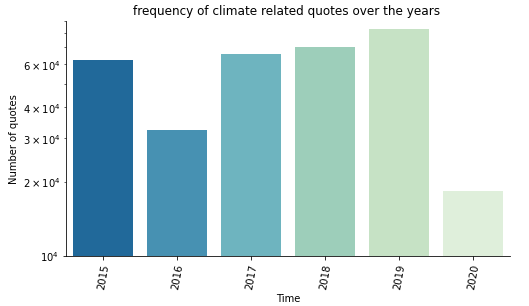
Unsurprisingly, we can see that from 2015 to 2019 the number of quotes that talk about climate have been rising, except for the year 2016 and 2020. This rise is explained by the fact that we are more and more aware of climate change due, in particular, to the huge mobiblisation of the younger generation. Indeed, at only 15 years old, Greta Thunberg became the leader of an ecologist movement during the Summer 2018 and her reputation has not stopped growing since.
Concerning the gap in the years 2020, the quotebank dataset has not extracted quotes since April 2020, that is why this year has less quotes. For the year 2016, the gap could be explained by the fact that the dataset is incomplete, or that there was actually less discussion about climate. The 8th November 2016 Donald Trump was elected President of the United States and the election was a major mediatic event, probably leaving less space for climate-change discussions. But still, the difference is huge (~30'000 quotes) and that is unlikely that this is the only explanation.
Climate-related events are spotable in the quotes distribution
In order to better understand this phenomena we can look at a monthly visualization of the temporal evolution of climate change speech in the newspaper :
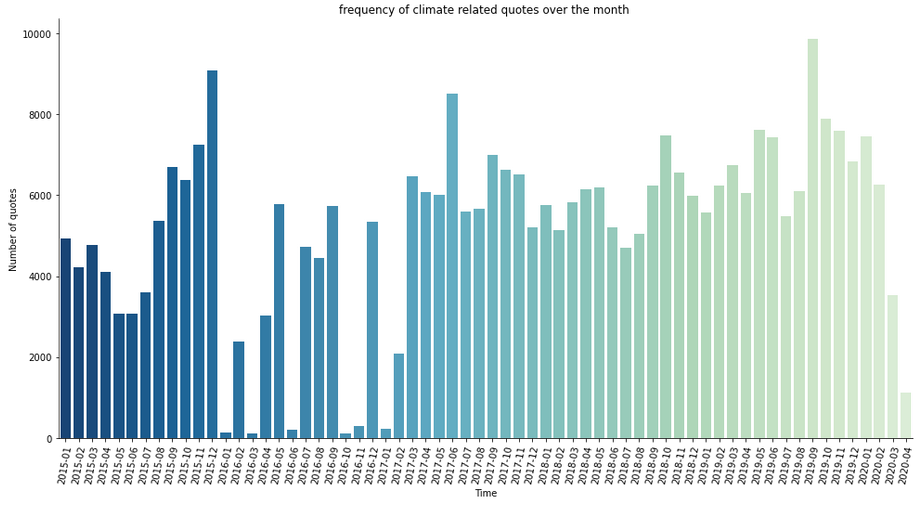
The year 2016 has seen a huge disparity in the number of quotes across the months. We assume that the gap is more likely explained by a lack of data. The lack of data could be in the original dataset. This hypothesis could be confirmed by plotting the distribution of the quotations from Quotebank over the last 6 years.
This plot also displays other interesting results. First of all, we can see an increase in the number of climate-related quotes in 2015. Especially, we can see a spike in December, corresponding to the adoption of the The Paris Agreement by 196 Parties at COP 21. We investigated the events that took place during the other big spikes we can see on the plot : In June 2017 President Trump announced the US withdrawal from the Paris climate agreement (BBC news) and in September 2019, a massive engagement from the younger generation took place, known as the Global Week for Future which was a series of climate strikes that took place from 20–27 September 2019.
Politicians are (too) chatty
To characterize the typical person who would most likely talk about climate in the media, we have first selected only the speakers of the quotations related to climate (cf. Dataset) and selected the 20 most frequent labels for each characteristic (occupation, religion, ethnic group, academic degree, gender, political party and nationality). The plots below correspond to the number of speakers per label. We only show here the plots for occupation and political party but the rest can be found on our notebook :
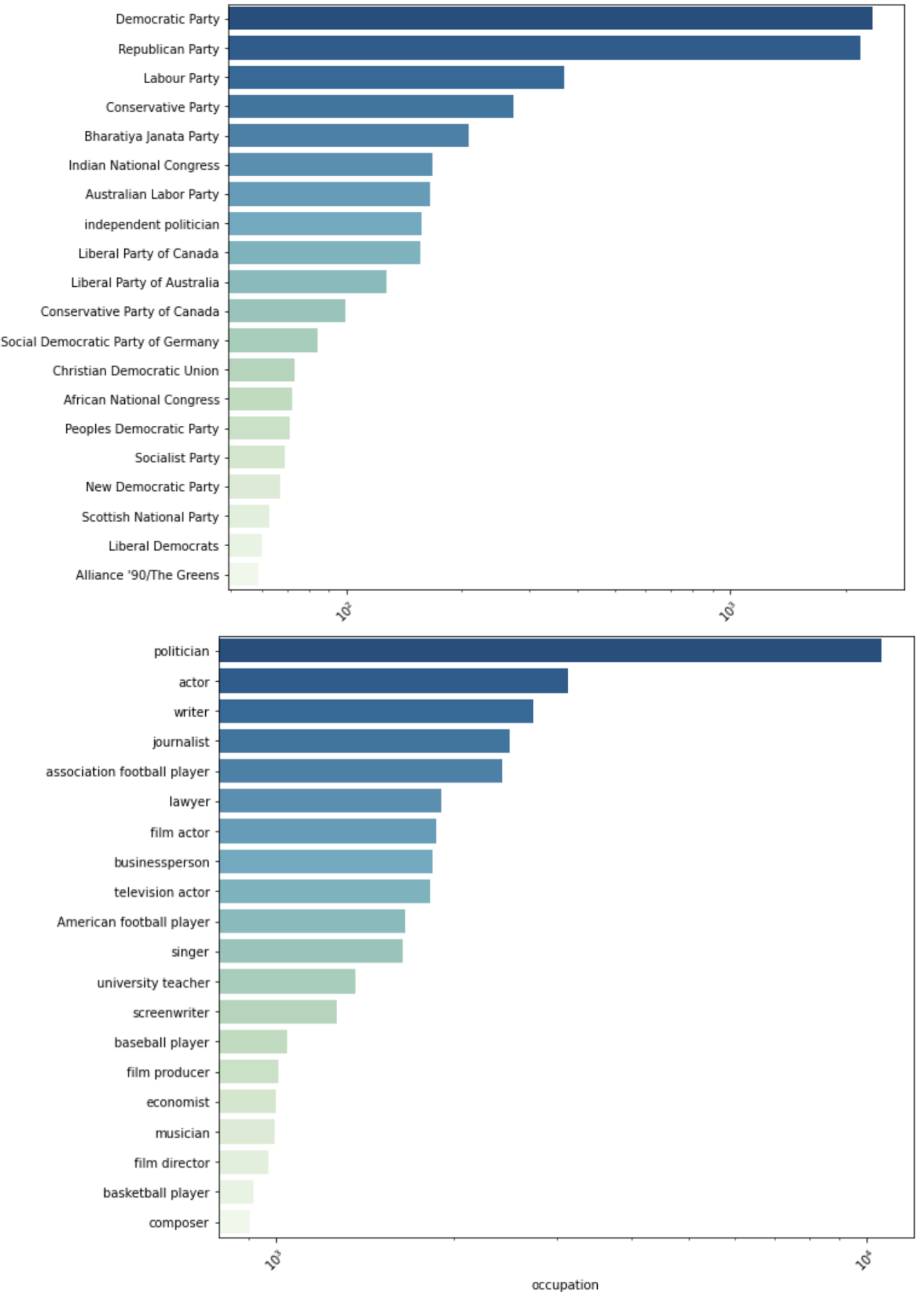
We can see that the first 5 occupations are, in order, politician, actor, writer, journalist and football player. The fact that the politicians are the first ones is quite obvious since it is nowadays a very politicized topic. Actors and football players are a bit more surprising but we can imagine that this is because these are more mediatized activities and their quotations can already be found in a higher number in the press. In order to confirm this hypothesis, we have plotted the occupation proportion of the speakers from Quotebank :
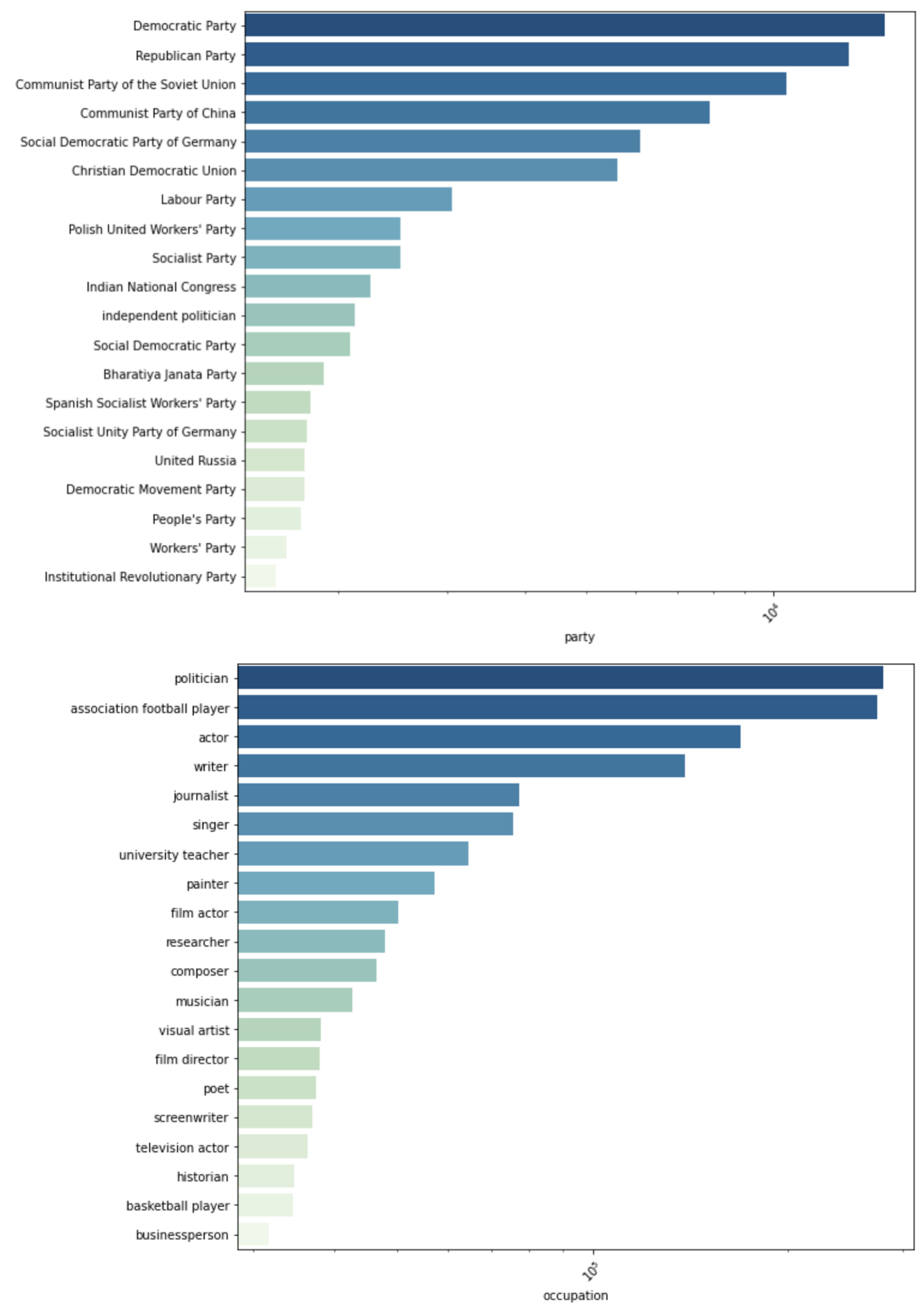
We observe that the top 5 occupations are similar which means that they are the type of people that are the most present in the press meaning that it was expected to find them in the top 5 of the climate speakers.
One thing we can notice on these graphs is the apparition of a polical party focused majoritarily on environmental concern in the climate-related distribution: The Greens. A critical thing to emphasize is that there are very little number of scientists, researchers or activits in the mediated climate-involved speakers. Rather than showing that they are not vocal about this issue, we point out that the mediatic place seems to be monopolized by politicians and celebrities (actors). This should be nuanced as we are looking at the speakers without considering how much they actually talk about climate in the media. We will now focus on the people that talk the most about climate.
Greta Thunberg > Mr. President
From the climate-related speakers we extracted 10 people with the highest number of occurrences over the years. Below are histograms representing the number of times the speaker has been quoted for something related to climate in the news :
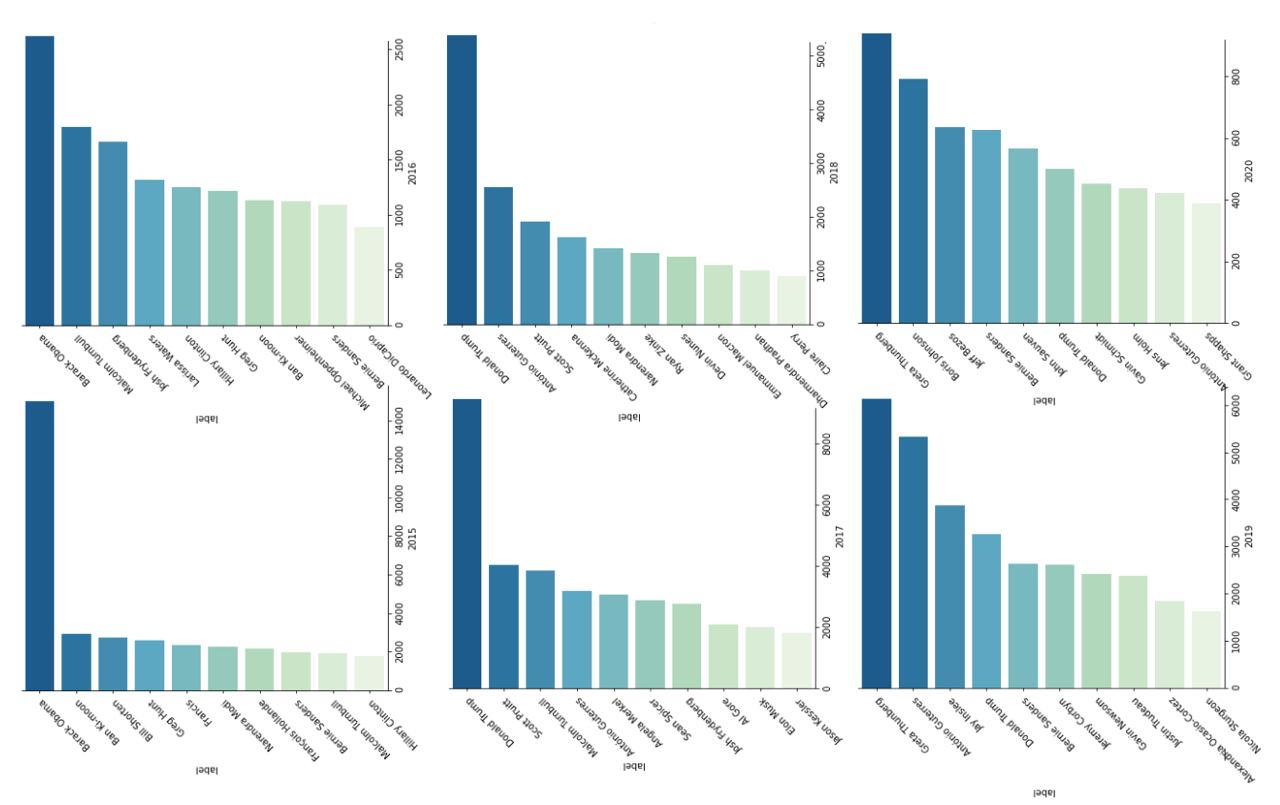
Between 2015 and 2018, we can see that the first speaker per year is the American President. This shows that the main opinion mediatized is a political one, meaning that it may not be very objective, and highly dependent on the President's party. After 2018, we see the fulgurant apparison of Greta Thunberg, a very famous climate activist. This shows a shift in the mediatic representation, from a political topic to a human issue. The rest of the speakers are mostly politicians, but we also see a progressive apparison of less known environmentalists and activists, such as John Sauven. These observations seem to indicate that a large majority of climate-related information given to the public is not objective. This could mean, for the public, that most climate-related input are actually political opinions, and not scientific facts.
Now, let us study the shift from politics to activism in the mediatization of the climate change topic. In order to do that, we studied the mediatic place of the top 3 observed speakers, namely Donald Trump, Greta Thunberg and Barack Obama.
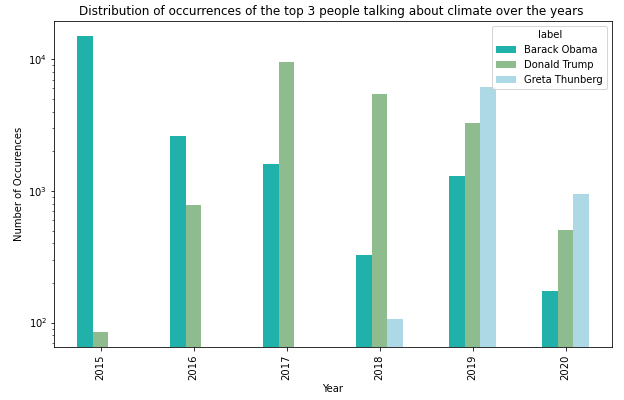
Once again, we see that we have a smaller number of quotes from 2020, (see Climate and environment are a hot topic now - Greta Thunberg section). Then, we see that from 2015 to 2017, we only have Barack Obama and Donald Trump. Then ,starting in 2018, we see the apparition of Greta Thunberg. She then managed to have a very high mediatic place very quickly. This shows us that the climate change is starting to be considered more as human concern, rather than a political subject.
Climate change is real.
We will now see if this shift can also be seen in the quotes themselves, by studying the top quotes of the top 10 speakers per year. We extracted quotes with
the maximum number of occurrences from each of the top 10 speakers of each year. This allows us to observe which ideas are most mediatized.
The top 10 quotes for each year can be found on our Notebook.
Our favorite for each year are listed below :
Put the focus back on climate science. - Greg Hunt, 2015.
Climate change is real. - Leonardo DiCaprio, 2016
Climate change is real. - Elon Musk, 2017
Could be hard to believe in global warming... Fortunately you didn't invite somebody skeptical with global warming this year! - Emmanuel Macron, 2018
There is no `middle ground' when it comes to climate policy. - Bernie Sanders, 2019
People are more aware now... climate and environment are a hot topic now. - Greta Thunberg, 2020
Looking at our top climate related quotes, we see a lot of people talking about the urgency of the climate change situation, but without stating the detailed scientific facts. This shows that, indeed the urgency is communicated, but the analysis showing that we are in a critical situation is not very mediatized. During the Trump Presidency, we see the rise of climate denier speakers such as Scott Pruitt. On the climate denier sides, we see that they seem to discredit major climate change related agreements, such as the Paris Agreement. One thing we can emphasize, is the apparition of a quote in accordance with the last IPCC report: "Even the solutions that we have considered big and bold are nowhere near the scale of the actual problem that climate change presents to us" (Alexandra Ocasio-Cortez). It seems like the sentiment of urgency communicated grows over the years.
The general feeling about climate change is (surprisingly) positive
Climate change is a very polarizing subject and we wanted to investigate the general feeling toward it in the media. To do this we performed the Vader Sentiment Analysis (cf. Methods) on climate-related quotations. This gave us the following results :
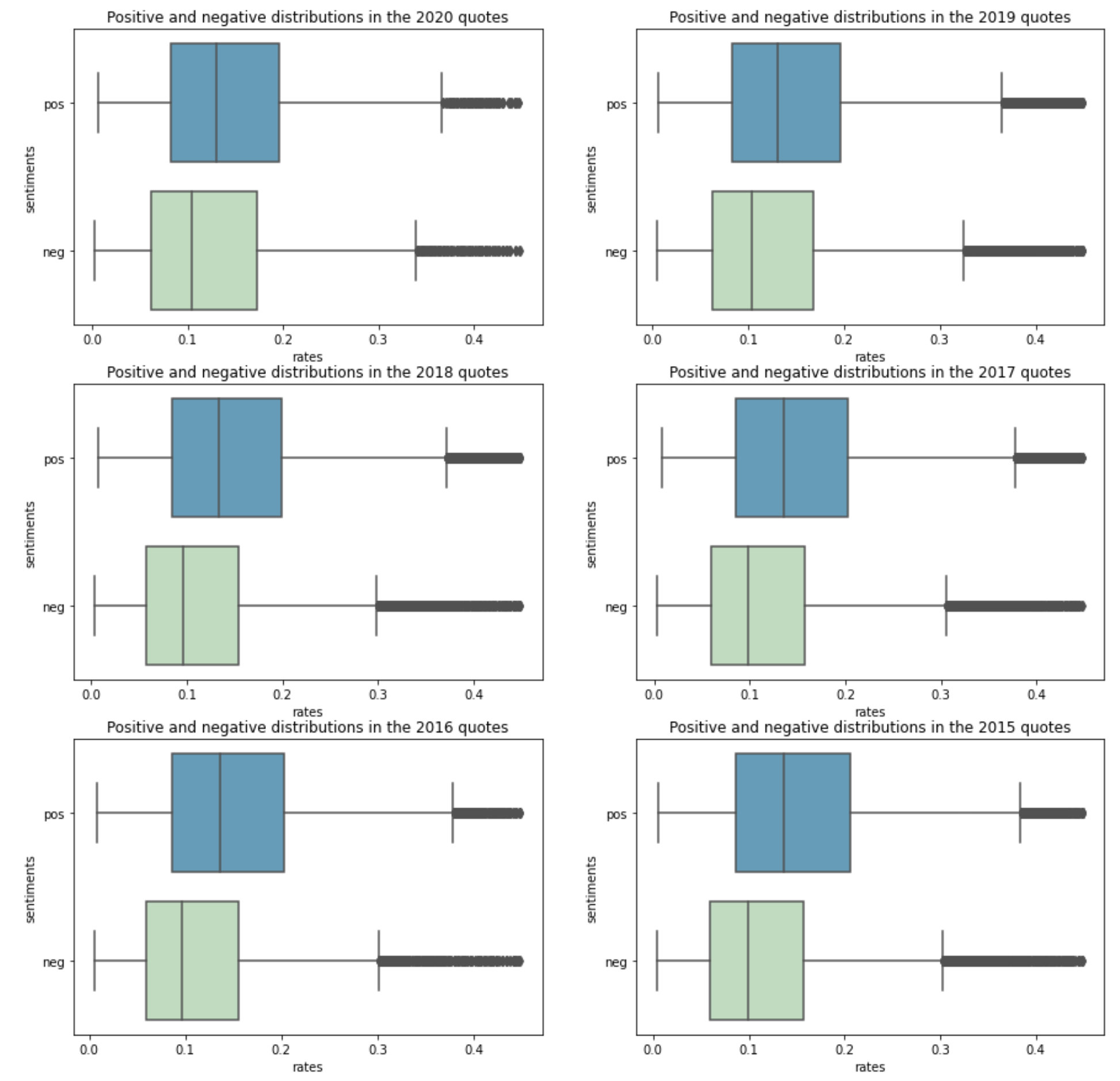
The plots above depict the proportion of positive and negative quotes among all the climate-related quotes for each year. We can observe that the general feeling is overall more positive than negative. We also see more extreme value for the negative feeling in 2020 than in 2015. This could be due to the climate emergency that is taking more and more space in people's mind and, consequently, in the media. On the contrary, the positive rate has more extreme values in 2015 than in 2020. We have also extracted the quotes with the highest rate for each year and they can again be found on our Notebook.
In order to check if this sentiment analysis makes sense we extracted the words with the highest frequency in the quotations with the highest positive or negative rate. The words clouds generated with them are below, red for negative and blue for positive :
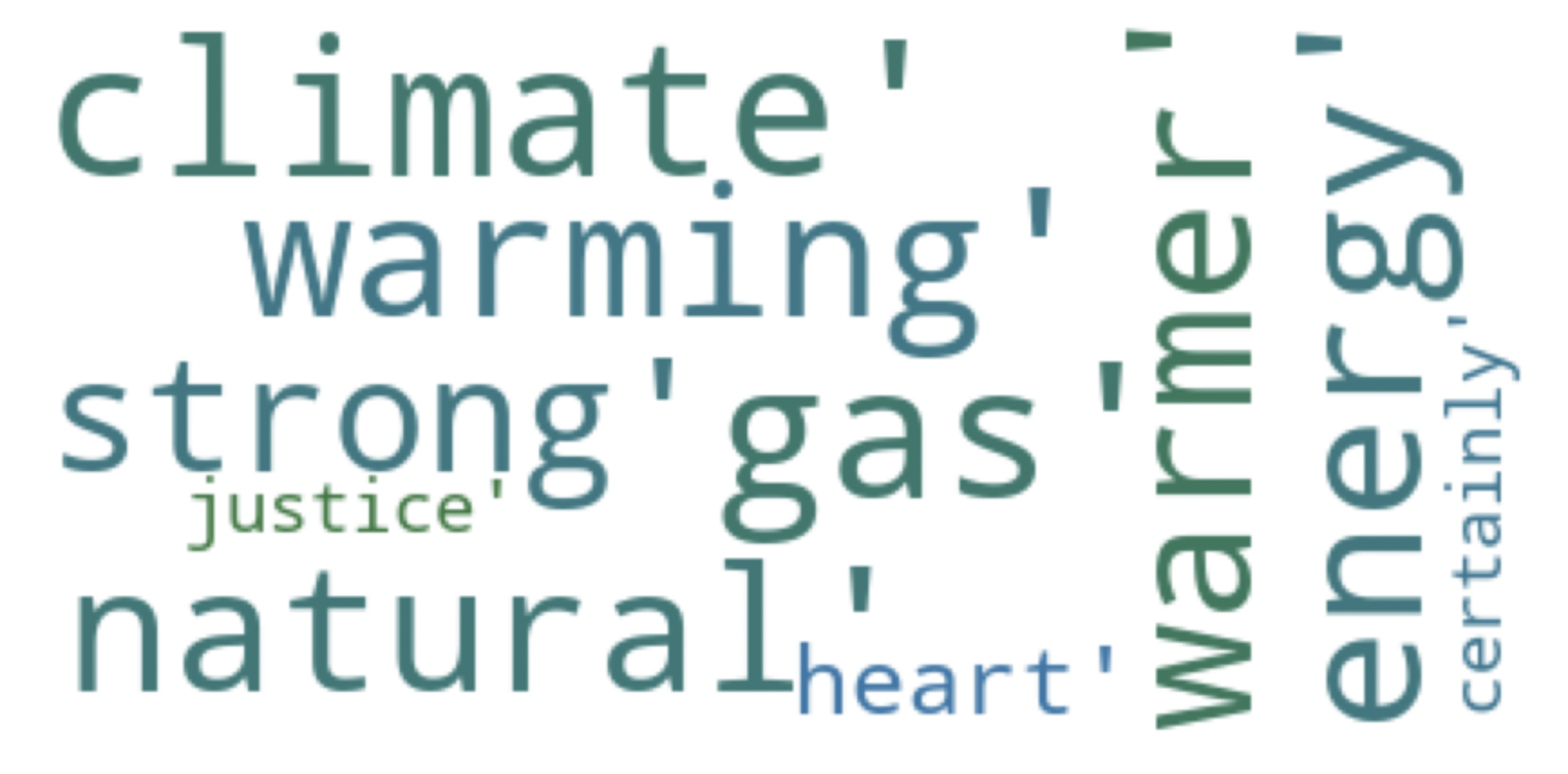
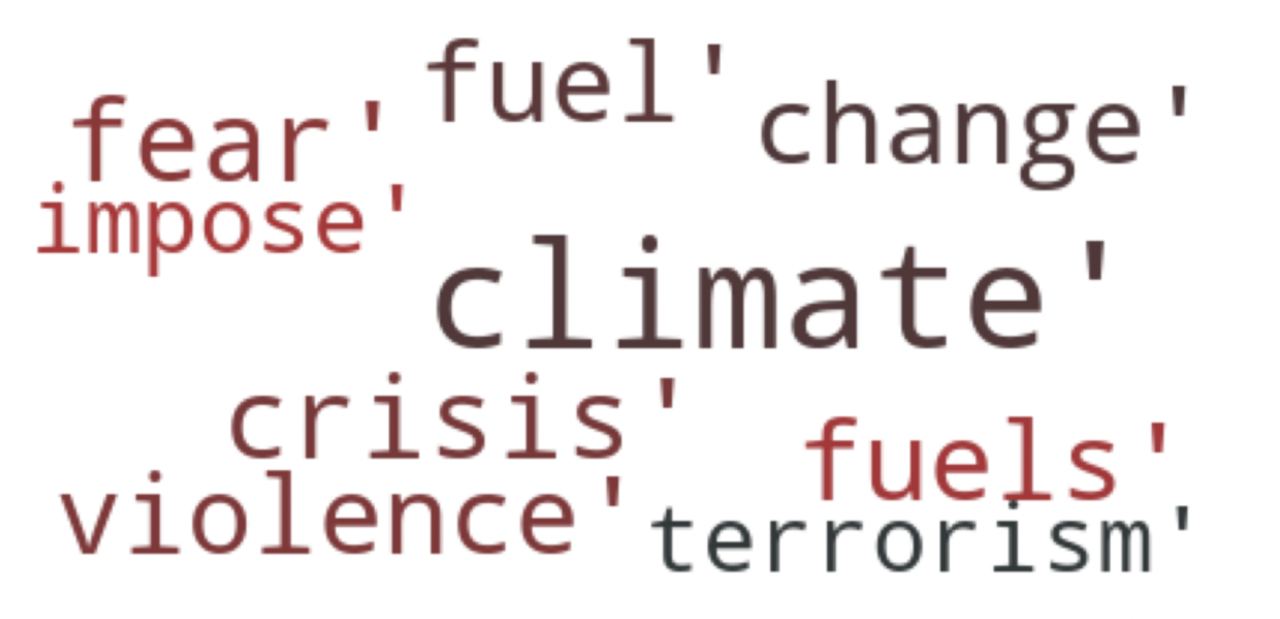
We can clearly see the feeling of fearness arising from the negative list of words. However we have to keep in mind that when a quote is classified as negative it does not mean that the speaker is sceptical about climate change. For example, some quotations containing the word "violence" or "terrorism" can either be in the direction of the ecologists, saying climate change will induce natural and economical crisis and thus more inequality among the population and thus will cause violence and increase terrorism, or be in the other direction, saying that ecologist activists are terrorists and establish an atmosphere of fear.
Democrats are more emotional about climate
While looking at the main profiles that talk about climate in the section above, we realised that the two major political parties in the US are the two most represented in the climate-related mediatic speech. As they are opponents of each other and knowing the propensity of the Republicans to doubt about the climate crisis, we would expect the democratic party to be more aware and concerned by climate change than republicans (2021 Chicago Council Survey). We have then looked at the general feeling in the quotes from Republicans versus Democrats :
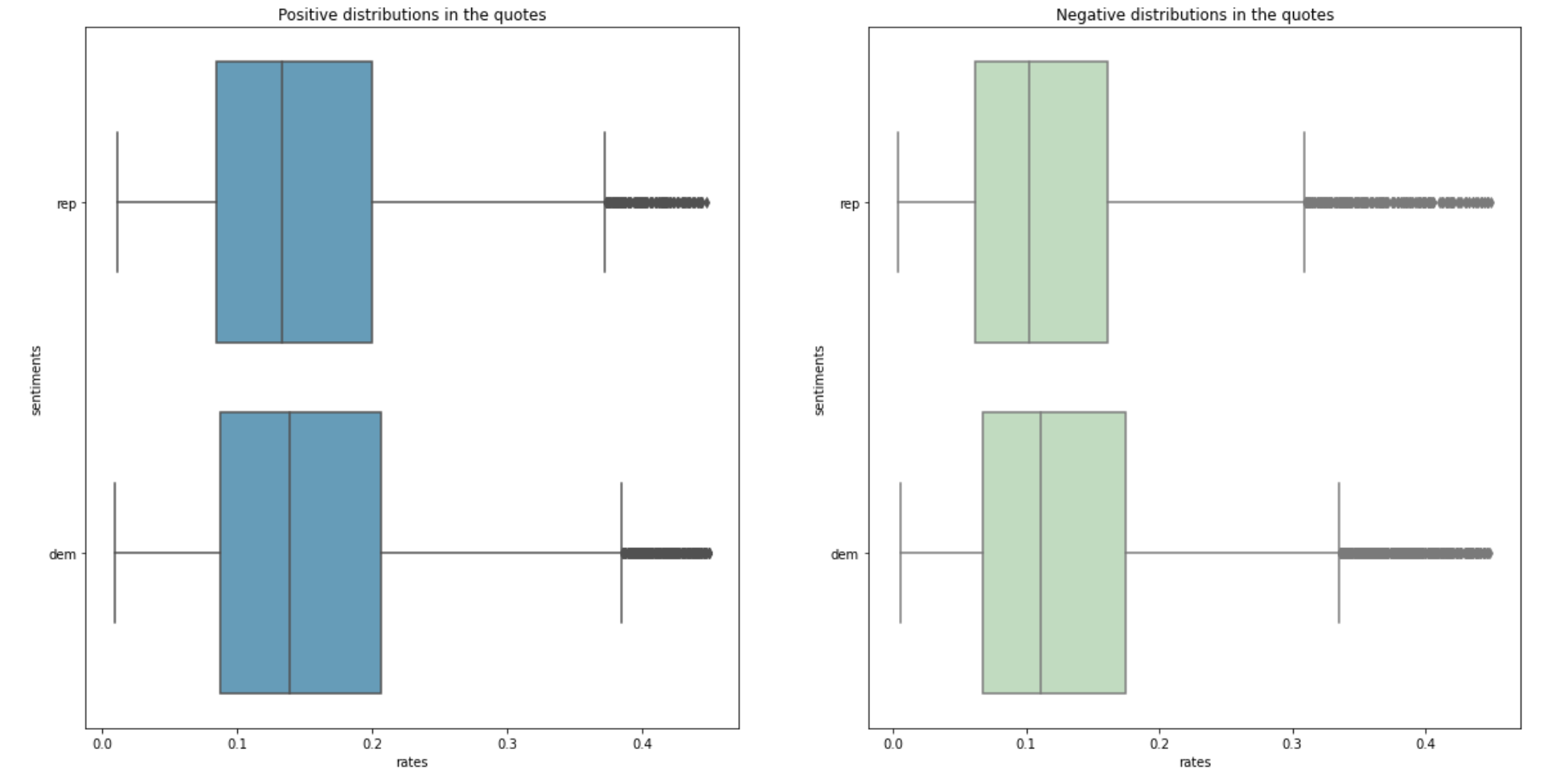
The blue boxplots are the positive rates for Republicans (upper) and Democrats (lower). The green ones are the respective negative ones. We observe that in both negative and positive cases the democratic party has slightly higher rates. But the median are very close to each other and the boxplots are overlapping. To determine if the means are significantly different, we performed two t-tests on, respectively, positive and negative rates :
Ttest_indResult(statistic=-5.872865752320066, pvalue=4.308443966327444e-09)
Ttest_indResult(statistic=-18.86696547764224, pvalue=3.852534994433051e-79)
According to pvalues that are both very small, we can conclude that the two means are significantly different and thus there is a difference between the two populations. Consequently, we observe that people from the democratic party have higher rates and this could be explained by a higher investment than the republicans.
Tell me who you are and I will tell you if you feel concerned about climate change
As we observed that some characteristics are over-represented in the climate speakers, we tried to create a prediction model based on logistic regression to infer the propensity of a person to talk about climate in the press based on their profile. This model will tell you, based on your occupation, religion, ethnic group, academic degree, gender, political party, nationality and age whether you are inclined to talk about climate in the press or not.
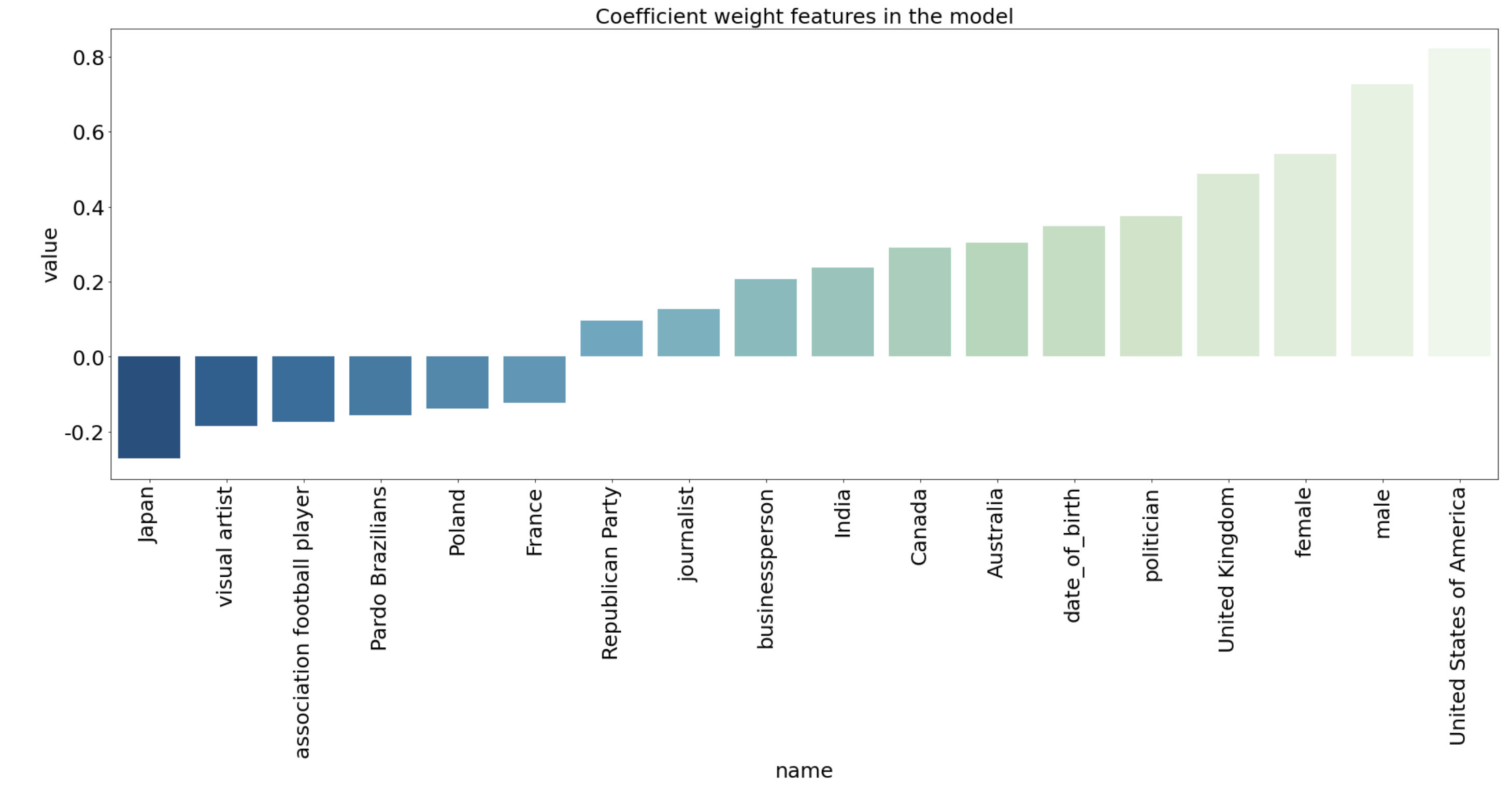
This plot displays the 19 most relevant features that predict whether a person is inclined to talk about climate. The more right and light the bar is the more you will be classified as a climate speaker in the media if you have this characteristic. The more left and blue the bar is the more likely you will be classified as a non-climate speaker. For example, we can see that a male speaker from the United States is more enclined to talk about climate in the media than a visual artist from Japan.
Climate change is a hot topic although not discussed by the hottest people
To conclude, we talk more and more about climate in the media. There is indeed a significant increase of climate related quotes over time in the news. The major climate speakers in 2015 were almost only politicians, but the activists are starting to impose themself in the media accross time and along with the emergency feeling. This can be supported by the shift from positive to negative feeling in the quotes over time. The negative feeling is dominated by fear whereas the positve by hope. This could reflect the panic brought by the climate change but also the motivation to change society that is gaining the heart of the people. The discussions in the media about climate tend to be more and more present, but the highlight of celebrities and the lack of climate experts deprive the circulation of good informations.